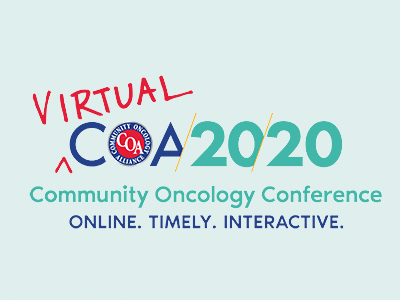The current COVID-19 pandemic not only forced the 2020 Community Oncology Alliance Conference to a virtual format, the impact of the virus also found its way into a lot of the content. The conference featured topical and important content, including:
- Top Community Oncology Issues Now and Looking Ahead
- Oncology Payment Reform
- Cancer vs COVID-19: What We Have Learned from the Crisis
- Emerging Trends in Telehealth and Information Technology
As the sessions unfolded, some themes for community oncology definitely emerged:
Methods of communication are permanently altered
Telehealth came up repeatedly during the conference as an important new method to care for patients while keeping them safely away from clinics. Cancer programs very quickly – a few days in many cases – launched telehealth services and found these new virtual medical appointments have been well received by patients and providers. In addition, CMS and other payers have made changes to enable expanded reimbursement for telehealth services, so telehealth is more financially feasible. Many speakers also acknowledged that other forms of electronic communication are necessary moving forward as well. Social distancing will be important for cancer patients for the foreseeable future, so integrated electronic patient-reported outcomes and other technology-based communication will be needed.
Adapting to change and fostering teamwork are essential
As the COVID-19 crisis unfolds, cancer programs are adjusting and responding as necessary. They are creating drive through labs, staffing plans that build in redundancies to plan for the worst, and revising policies as new information becomes available. Patient safety is the number one concern, but cancer doesn’t stop, so practices are figuring out new and creative ways to care for patients. One speaker emphasized how the crisis has brought his practice together and many other echoed this sentiment – everyone has come together, worked hard, and found a way to continue to safely deliver cancer care.
Community oncology is vital to cancer care
The fact that community cancer practices quickly figured out how to stay open and provide care for their patients all while completely altering their day to day operations is not only meaningful to vulnerable patients who rely on them, but also to hospitals that are facing their own unprecedented challenges. Community practices are keeping patients out of emergency rooms and that’s benefiting patients, who are vulnerable, and hospital staff, who are worried about their capacity to care for everyone who needs them.
Navigating Cancer is fortunate to work with many of the practices that were represented during the conference, so we know first hand how dedicated community oncology practices are to their patients. Thanks to COA for advocating for community cancer care and hosting this terrific event!
